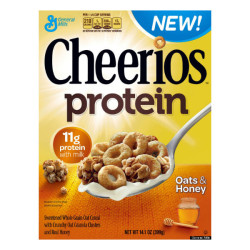Top Class Actions’s website and social media posts use affiliate links. If you make a purchase using such links, we may receive a commission, but it will not result in any additional charges to you. Please review our Affiliate Link Disclosure for more information.

General Mills argued on Jan. 29 that its labeling on the Cheerios Protein met the federal guidelines that have been established for food products and that the company is not required to make nutritional comparisons between Cheerios Protein and the original “yellow box” Cheerios product.
Plaintiffs Nancy Coe and Tori Castro of California and Pamela Mizzi of New York filed the lawsuit against General Mills in November claiming that the company falsely advertised its Cheerios protein as being healthier than the original Cheerios. The plaintiffs claimed that the difference in the amount of protein between the original Cheerios formulation and the Cheerios Protein was negligible, but the way the information was presented by the company made the similarity seem less apparent to a consumer.
The original Cheerios contains 3 grams of protein per 28-gram serving without a reference to the daily value percentage, and Cheerios Protein is labeled as having 7 grams of protein per 55-gram serving, equaling approximately 10 percent of the daily value.
General Mills states, “Plaintiffs’ objection is that the protein content of Cheerios Protein is not sufficiently higher than Yellow Box Cheerios, and that Cheerios Protein, in their opinion, should have ‘substantially more’ and ‘materially higher protein levels’ than it currently does.” The company argued that the Nutrition Labeling and Education Act does not require companies to provide product nutrition comparisons on their labels.
In addition to the protein content claims, the plaintiffs also noted that Cheerios Protein has 17 times more sugar than the original Cheerios product. According to the General Mills class action lawsuit, unlike other Cheerios products that make reference to the difference in the product name, such as “Chocolate Cheerios,” the Cheerios Protein product does not have such a reference in its name.
In response to the plaintiffs’ claim that the omission of added sugar labeling by General Mills was misleading, the cereal company asserted that their label accurately reflects the amount of sugar and is consistent with federal labeling regulations.
“Plaintiffs assert that sugar is the ‘key differentiating ingredient between [Cheerios Protein] and Cheerios,’ and suggest that General Mills should be required to instead name its product ‘Sugar Frosted Cheerios’ or something similar,” General Mills stated. The company accused the plaintiffs of “attempt[ing] to invent a requirement” that the sugar content be disclosed in a different way.
General Mills also addressed the issue of daily value percentage labeling by explaining, “Because Cheerios Protein contains 10% of the Daily Value of protein, it qualifies under these regulations as a ‘good source’ of protein and makes that nutrient content claim on the product label.” The company also maintained that the label on Cheerios Protein was designed to indicate that the product had been specifically formulated to include “high-quality” sources of protein.
The plaintiffs are represented by Laurence D. King and Linda M. Fong of Kaplan Fox & Kilsheimer LLP, Maia Kats and William Thanhauser of Center for Science in the Public Interest, and Michael R. Reese of Reese LLP.
The Cheerios Protein False Advertising Class Action Lawsuit is Nancy Coe, et al. v. General Mills Inc., Case No. 3:15-cv-05112, in the U.S. District Court for the Northern District of California.
UPDATE: On April 20, 2016, General Mills urged a California federal judge to dismiss a class action lawsuit alleging the labels on its Cheerios Protein cereals do not adequately inform consumers about the amount of protein and sugar in the product.
UPDATE 2: On Aug. 10, 2016, General Mills will continue to face a false advertising class action lawsuit over Cheerios Protein, following a decision by a federal judge to dismiss some of the plaintiffs’ claims and to let the rest proceed.
UPDATE 3: On Oct. 21, 2016, cereal consumers alleging General Mills falsely markets its Cheerios Protein cereal as having significantly more protein than regular Cheerios fight a motion to dismiss a class action lawsuit.
ATTORNEY ADVERTISING
Top Class Actions is a Proud Member of the American Bar Association
LEGAL INFORMATION IS NOT LEGAL ADVICE
Top Class Actions Legal Statement
©2008 – 2024 Top Class Actions® LLC
Various Trademarks held by their respective owners
This website is not intended for viewing or usage by European Union citizens.















4 thoughts onGeneral Mills Tries to Sink Cheerios Protein False Ad Class Action
UPDATE 3: On Oct. 21, 2016, cereal consumers alleging General Mills falsely markets its Cheerios Protein cereal as having significantly more protein than regular Cheerios fight a motion to dismiss a class action lawsuit.
UPDATE 2: On Aug. 10, 2016, General Mills will continue to face a false advertising class action lawsuit over Cheerios Protein, following a decision by a federal judge to dismiss some of the plaintiffs’ claims and to let the rest proceed.
UPDATE: On April 20, 2016, General Mills urged a California federal judge to dismiss a class action lawsuit alleging the labels on its Cheerios Protein cereals do not adequately inform consumers about the amount of protein and sugar in the product.
UPDATE: On April 20, 2016, General Mills urged a California federal judge to dismiss a class action lawsuit alleging the labels on its Cheerios Protein cereals do not adequately inform consumers about the amount of protein and sugar in the product.